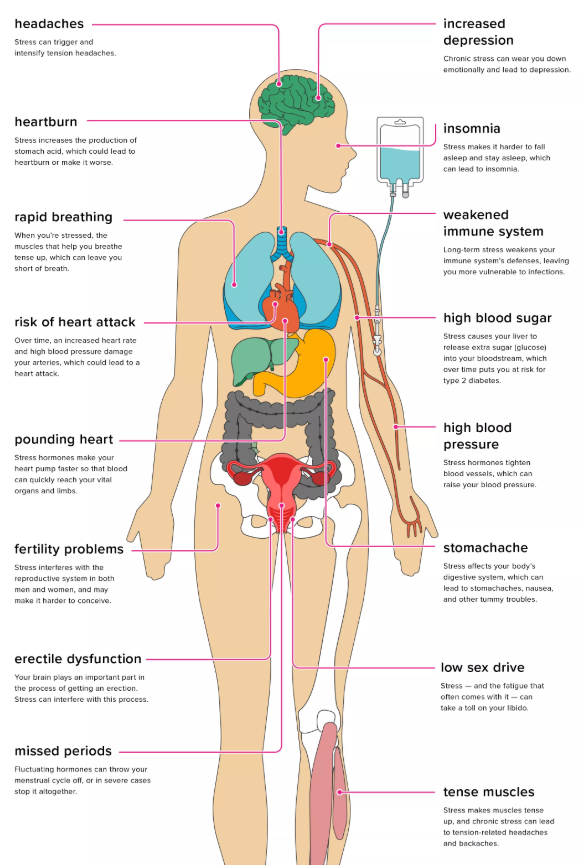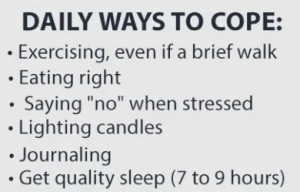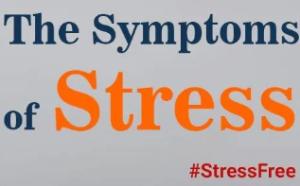Your emotions can indicate when you’re under too much stress. For example, feeling irritable or overwhelmingly fearful can be signs of stress, as well as atypical changes in mood.
Stress, defined as emotional tension or mental strain, is all too common of a feeling for many of us.
According to the American Psychological Association (APA), the average stress level of adults in the United States in 2015 was 5.1 on a scale of 1 to 10.
SIGNS OF STRESS


Too much stress can produce both physical and emotional symptoms.
Let’s look at some of the emotional signs of stress and what you can do to reduce and manage them.W
The Anxiety and Depression Association of America (ADAA) defines diagnosed depression as an illness in which an individual experiences a persistent and severe low mood.
Researchers have found connectionsTrusted Source between high levels of stress and the onset of depression.
A 2020 animal studyTrusted Source also suggested these connections, in addition to a protein in the brain that is important for the functions of both serotonin and for the release of stress hormones. This could have important implications for new treatments for depression.
Another 2015 observational studyTrusted Source examined stress levels of the working age population, measuring participants’ overall stress levels and symptoms. Depression was more common in people who reported higher levels of stress.
Treatment
- Reach out to a mental health professional.
- Both psychotherapy and medication can be effective treatments.
- Support groups, mindfulness techniques, and exercise may also help.
2. Anxiety
Anxiety differs from depression in that it’s characterized by feelings of overwhelming dread or fear.
However, like depression, studies have suggested that stress may be linked to anxiety and anxiety disorders.
In one 2015 studyTrusted Source, researchers investigated the effects of stress levels at home and work on anxiety and depression levels. They found that people who experienced high levels of work stress were more likely to have more symptoms of anxiety and depression.
Treatment
- Reach out to a mental health professional.
- Treatment options include psychotherapy and medication.
- Alternative and complementary treatments are also available.
3. Irritability
Irritability and anger can become common traits in people who are stressed.
In one older 2014 studyTrusted Source, higher levels of anger were associated with both mental stress and the possibility of a stress-related heart attack.
Another studyTrusted Source investigated the relationship between anger, depression, and stress levels in caretakers. The researchers found an association between care-related chronic stress and anger levels.
Treatment
- A variety of strategies can help keep anger levels under control. Relaxation techniques, problem solving, and communication are all great methods for helping to curb anger.
- Anger management techniques can help to reduce the stress in situations that’d normally leave you frustrated, tense, or angry.
4. Low sex drive
In some people, too much stress can have a negative impact on sex drive and the desire to be intimate.
A studyTrusted Source published in 2014 found that chronic stress levels had a negative impact on sexual arousal. The research suggested that both high levels of cortisol and a higher chance of being distracted led to lower levels of arousal.
Much of the research surrounding stress and low libido involves women, but it can certainly affect others, too. One animal studyTrusted Source showed that social stress during adolescence affected the sexual appetite of male hamsters during adulthood.
Treatment
- Reducing stress can help to restore your sex drive and improve libido.
- Self-care, relaxation techniques, and exercise are a few ways to raise self-confidence.
- Improving communication with a sexual partner may improve intimacy and restore positive feelings towards sex.
5. Memory and concentration problems
If you find yourself having trouble with concentration and memory, stress may be a part of the problem.
A 2015 animal studyTrusted Source found that adolescent rats exposed to acute stress experienced more memory performance issues than their non-stressed counterparts.
Another 2014 review Trusted Source investigated the stress-response pathways in the brain and their effect on long-term memory. Researchers found that certain hormones following a stressful or traumatic event can have the ability to impair memory.
Treatment
- Various lifestyle changesTrusted Source may help improve memory.
- Maintaining a balanced diet and keeping your body and mind active can keep you focused.
- Avoiding activities like drinking and smoking can help keep your brain healthy.
6. Compulsive behavior
There has long been a link between stress and compulsive behaviors.
One paperTrusted Source expanded on the idea that stress-related changes in the brain may play a role in the development of addiction. According to the researchers, chronic stress can change the physical nature of the brain to promote habit- and addiction-forming behaviors.
Another 2018 studyTrusted Source found more associations between stress response and addictive disorders as well as other health consequences.

Treatment
- Healthy lifestyle habits can help to reduce compulsive behavior. For more serious compulsive behaviors, professional help may be necessary.
- If you’re concerned about substance use, the National Institute on Drug AbuseTrusted Source has resources for starting on the road to recovery. These include lifestyle recommendations to help manage stress.
7. Changes in mood
The many emotional effects of stress can leave you feeling like you’re experiencing abrupt changes in mood.
One studyTrusted Source from 2014 examined the role of various types of stress tests on physiology, mood, and cognition. The research showed that both social and physical stressors can have a big impact on emotional well-being and mood.
With the many emotional signs of stress, it’s easy to see the influence stress can have on your overall mood.
Treatment
There are many ways to improve your mood, such as:
- reducing stress
- enjoying nature
- celebrating with friends
- using mindfulness techniques
For more serious changes in mood that don’t seem to go away, reach out to a mental health professional for help.
Read Also: Depression and Stress Management
Ways to manage and reduce your stress
Reducing the emotional symptoms of stress starts with reducing the sources of stress in your life.
The American Institute of Stress explains that while there are a variety of stress-reducing techniques, finding ones that work for you is important.
- Physical activities such as running, jogging, and aerobics are a great way to physically relieve stress and tension.
- Relaxing physical activities such as yoga or tai chi can help to work your body while relaxing your mind. Try these yoga poses to relieve stress.
- Mindfulness techniques such as meditation can strengthen your emotional responses to stress.
- Reducing stress in different areas of your life, when possible, can help to lessen your exposure to chronic stressors.
- Mobile apps may calm your mind and offer guided conversations to help you manage stress and anxiety.
What’s the outlook?
Finding the stress-reducing techniques that work for you is an important step in decreasing emotional symptoms of stress.
Over time, you may find that your resolve against stress becomes stronger and that your symptoms improve.
However, if you find that you’re having trouble managing the emotional aspects of everyday or chronic stress, it may be best to reach out to a mental health professional.
Keep in mind that stress can also affect your physical health. It’s important to get help to stay in your best shape, emotionally and physically.
Depression at Night: How to Cope with Nighttime Depression
Symptoms of depression at night
Experiencing depression at night may have a number of different symptoms for different people. Some people may experience an increase in the severity of their depression symptoms. Others may experience increased feelings of isolation, hopelessness, and emptiness at night.
Racing thoughts and agitation may also occur, which can lead to difficulty sleeping. For more information on symptoms of depression, check out a thorough list here.
What causes depression at night?
There are a number of causes that can contribute to increased depression at night.
One commonly suggested reason for the increase is the lack of distractions. During the day, it’s a little easier for some people — especially those with mild or moderate depression — to keep themselves busy. Work, school, or social activities act as a distraction during the day. But at night, when you settle down to sleep, there’s nothing but you and your thoughts.
Researchers have looked into other things that could be increasing our nighttime depression symptoms. According to 2013 research on animals, bright lights (especially blue and white) at night can not only keep us awake, but may also increase symptoms of depression. In the study, even having a TV on in a dark room increased the animal’s cortisol levels and created changes in their hippocampus, both of which can increase depressive symptoms.
It’s also thought that if your circadian rhythm is disrupted, your depression may be triggered or your symptoms could increase in severity. One 2009 studyTrusted Source found that increased artificial light can significantly disrupt our circadian rhythm, causing or increasing mood disorders like depression.
Tips for coping
Fortunately, there are a number of ways you can cope with depression that occurs or increases in severity at night. For depression symptoms, regardless of the time of day they show up, you should maintain the treatment plan prescribed by your doctor. This includes taking your medications, even when you feel fine.
If your symptoms of depression are new for you or you’re currently not being treated, you should make an appointment to see a doctor. They can give you a diagnosis and help you to find treatment that works for you.
To manage your nighttime depression, you may consider trying some of these tips to help improve your symptoms from worsening at night:
- Unwind at least two hours before bed. This lets your body start to slow down and get ready for sleep. Good sleep is important for overall health and well-being.
- Keep work and anything stressful outside of the bedroom. This can help to make your sleeping space more calming and positive. Consider making your bedroom a screen-free room if you can.
- Practice stress-relieving activities. Calming activities that relieve stress like painting or mindful baking can help you cope with your depression at night. Yoga and meditation can also help you relieve stress before bed.
- Avoid bright screens. Try not to look at any bright screens for at least two hours before bed, and dim the lights as much as possible.
- Limit alcohol and caffeine intake. Both of these can increase symptoms of depression. Caffeine too late in the day can also disrupt your sleep.





